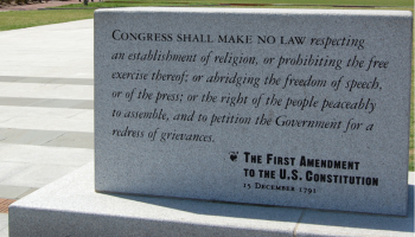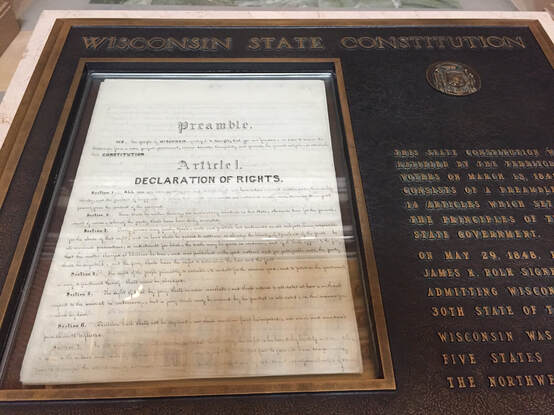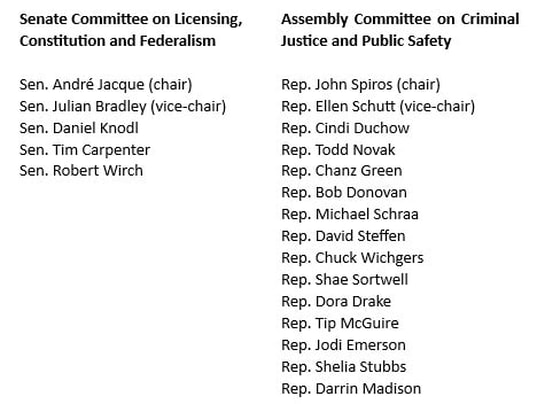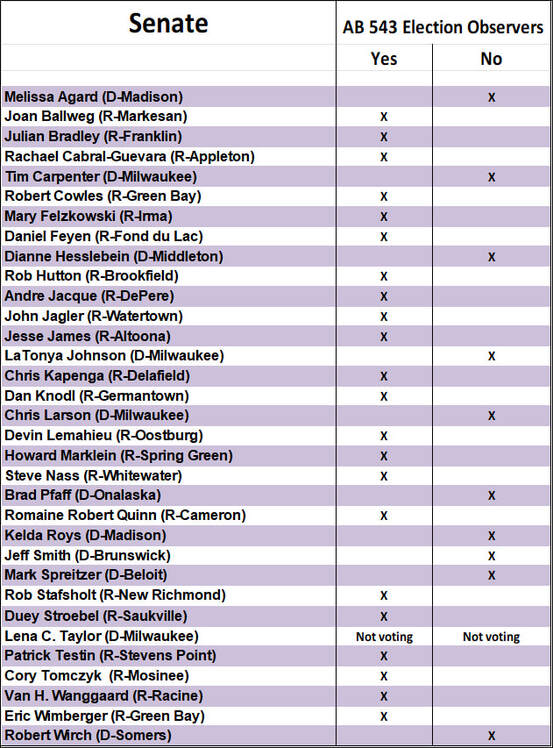|
By Margo Kirchner
Wisconsin courts will now accept written declarations instead of notarized affidavits in civil litigation. A new law eliminates the need for a notary’s signature and stamp on various documents in civil proceedings. Rather than swearing to the truth of written statements before a notary, a person may now “declare under penalty of false swearing under the law of Wisconsin” that what they are signing is true. The law should reduce litigation costs and simplify the submission of evidence during pretrial stages of a civil case. Attorneys will not need their clients to come to an office to get signatures notarized before filing evidence on summary judgment motions. Individuals representing themselves will not need to find and pay for notary services to file affidavits of poverty or other documents. Affidavits with a notary’s signature and stamp are still accepted. The law simply gives declarations made under penalty of perjury the same effect. Called the Uniform Unsworn Declarations Act, the law brings Wisconsin in line with federal courts and several other states. The use of declarations instead of affidavits has been the norm in federal courts for almost 50 years. The new law has some exceptions. Oaths of office, depositions, and real estate documents will still require swearing before a notary. The Wisconsin Judicial Council, a state agency focused on rules of procedure in the courts, recommended the law. Judicial Council members Sen. Van Wanggaard (R-Racine) and Rep. Ron Tusler (R-Harrison) sponsored the bill and steered it through the Legislature. The Uniform Law Commission, a nonprofit and nonpartisan organization advocating for consistent laws across states, supported the bill in written testimony before Senate Committee on Judiciary and Public Safety. Gov. Tony Evers signed the law (2023 Wis. Act 245) on March 27. It went into effect on March 29. Previously, Wisconsin law did allow declarations made under penalty of perjury by persons outside of the United States. Act 245 now permits declarations by persons located within the United States as well.
0 Comments
By Gretchen Schuldt
Gov. Tony Evers on Wednesday signed a bill allowing Wisconsin judges to take court action against people or businesses that post on the internet publicly available judicial officers’ personal information without the judges’ consent. Even their marital statuses could be off limits. Generally, under the First Amendment, governments cannot tell people what information they can or cannot post or share. But this law gives individual judges the private right of action to have the information removed from the Internet. Judges from around the state supported the bill in public testimony, as they did the other two bills in the three-bill package. State Supreme Court Chief Justice Annette Ziegler said the law was patterned after similar protections for federal judges and judges in other states. The governor signed all three bills in the package, including a constitutionally questionable bill, Assembly Bill 965 (now Act 234), that prohibits even peaceful demonstrations near a judge’s residence if the demonstrators are trying to disrupt the courts or influence the judge. The measure would criminalize violations, with a maximum punishment of up to $10,000 and nine months behind bars. WJI covered that bill here. The third approved bill, Assembly Bill 967 (now Act 236), exempts judicial security forms from public records disclosures. The forms are used to create security plans for judges. The internet prohibition, Assembly Bill 966 (now Act 235), requires “all persons, businesses, and associations” to “refrain from publicly posting or displaying on the Internet publicly available content that includes the personal information of the judicial officer or the judicial officer's immediate family,” according to the Legislative Reference Bureau summary of the measure. The law singles out data brokers as being included in the prohibitions. Individual judges would have to request nondisclosure, and that request would be good for 10 years. The law allows those judges to request the personal information be removed from the internet and gives the posting party 10 days to comply. Judges could seek an injunction or declaratory relief from a fellow judge if violations occur. If the filing judge wins the case, the posting person or entity “responsible for the violation shall be required to pay the judicial officer's costs and reasonable attorney fees,” the law says. Prevailing respondents in those cases would not be guaranteed the same financial compensation. The posting party would be required to “ensure that the judicial officer's personal information is not made available on any website or subsidiary website controlled by that person, business, or association; and identify any other instances of the identified information that should also be removed,” the law says. The law prohibits the sharing of information "through any medium" after a judge requests nondisclosure unless the information is voluntarily posted by the judge or immediate family member or if the judge requests the information be shared. “Publicly available content” is defined in the law as any document or record “that provides information or that serves as a document or record maintained, controlled, or in the possession of a government agency that may be obtained by any person or entity, from the Internet, from the government agency upon request either free of charge or for a fee, or in response to a public records request.” An exception would be made for information voluntarily posted on the internet by judges themselves, information the judges consent to have released, or information received legally from a federal or state government source. Immediate family members could release personal information about themselves. The government may step in under some circumstances. The legislation makes it a felony to post information if it is done to create or increase a threat to the health and safety of the judge or immediate family or if injury or death "is a natural and probably consequence" of posting the information, according to the law. Also under new law, candidates for judicial office or circulating or signing nomination papers would not have to list their names and addresses. Instead, they would file a confidential certification of residency with the Wisconsin Elections Commission. The protections apply to Supreme Court justices or former justices; municipal, circuit, tribal, reserve, and appellate judges and former judges; and court commissioners and former court commissioners. “Immediate family” is defined in the law as a judicial officer's spouse; a child of the judicial officer or of the judicial officer's spouse, including a foster child or an adult child living with the judicial officer; a parent of the judicial officer or the judicial officer's spouse; or any other person who resides at the judicial officer's residence. Personal information, as defined in the law, includes a home address; home or personal mobile telephone number; personal email address; Social Security number; driver's license number; federal tax identification number or state tax identification number; bank account or credit or debit card information; license plate number or other unique identifiers of vehicles regularly used by a judicial officer or a family member; identification of minor children; a full date of birth; employment location, including the name or address of an employer and employment schedules; and marital status. Employment information does not include information about employment by a government agency. By Gretchen Schuldt Judges from around the state are supporting a bill that would outlaw protests at their homes, but a constitutional law professor says the measure raises First Amendment concerns. The bill would prohibit people from demonstrating near a judge’s residence if they are trying to disrupt the courts or influence the judge. The measure would criminalize violations, with a maximum punishment of up to $10,000 and nine months behind bars. The word “near” is used but not defined in the legislation, Assembly Bill 965 / Senate Bill 926. A chart showing the sponsors of the measure is at the bottom of this post. Ed Fallone, a constitutional law professor at Marquette University, said in an interview that the U.S. Constitution’s First Amendment generally does not allow a group to exist in a protected “bubble” denied to others. The bill would create such exclusive protections, he said. That amendment protects freedoms of speech and religion and the rights to peaceably assemble and petition the government for a redress of grievances. Those offering testimony in favor of the bill included state Supreme Court Justice Annette K. Ziegler and judges from St. Croix County, the District II Court of Appeals, Juneau County, the U.S. District Court for the Eastern District of Wisconsin, Dunn County, Sauk County, Fond du Lac County, Washburn County, Dodge County, Racine County, Sheboygan County, Clark County, Sheboygan County, Ozaukee County, Outagamie County, Brown County, Chippewa County, Waukesha County, Brown County, Dane County, Calumet County, Barron County, Manitowoc County, Monroe County, Door County, Milwaukee County, and Rusk County. The State Bar of Wisconsin also offered testimony in support. The bill is one of three about judges and their security concerns. Judges' written testimony on the three-bill package included discussion of security for their families and them; incidents they had experienced personally; and the June 2022 murder of retired Juneau County Judge John Roemer by a man Roemer sentenced years earlier. In some instances, multiple judges from the same county signed on to testimony in support of the bill, raising potential conflict-of-interest issues if the measure becomes law and the judges are asked to rule on related cases. The Assembly’s Criminal Justice and Public Safety Committee recommended passage of the bill, 13-2, with Reps. Dora Drake (D-Milwaukee) and Jodi Emerson (D-Eau Claire) opposed. The full Assembly approved the measure without a roll call vote. The Senate’s Judiciary and Public Safety Committee recommended approval on a 5-1 vote, with State Sen. Kelda Roys (D-Madison) opposed. The bill is pending before the full Senate. In her written testimony to the Assembly committee, Ziegler said that “Judges should not be threatened with acts of violence from people or groups who want to intimidate or harm us, push a cause, subvert the rule of law, or control the outcome of a case. That is a basic tenet of Judicial independence.” The bill is modeled on a federal statute, she said. The Wisconsin bill, unlike the federal statute, “removes the prohibition …against picketing, parading or demonstrating at, in, or near a building housing a court,” Ziegler wrote. The federal law, adopted in 1950, prohibits the same type of picketing of federal judges’ residences as the Wisconsin bill would ban. It also has raised recent First Amendment questions, especially after protests in front of U.S. Supreme Court Justice Brett Kavanaugh’s house in the wake of the Dobbs decision overturning abortion rights. Allowing courthouse picketing, which judges can easily avoid entirely, is not enough, Fallone said. “One of the aspects of your free speech right is to be heard by the person you’re expressing your opinion to,” he said. While he sympathizes with judges seeking to reduce the stress levels of their jobs, Fallone said, protections such as those proposed should be limited to specific judges in response to specific events or threats. If judges deserve special security considerations, those protections could well spread to other protest targets, thus further limiting the scope of the First Amendment, he said. Bill Sponsors
By Alexandria Staubach
Wisconsin voters in April will see two referendum questions focused on perceived voting issues. Senate Joint Resolution 78 passed the Legislature in November and will appear on the April 2 ballot as two questions about amending the state constitution. If approved by a majority of voters, the amendments would enshrine in the Wisconsin Constitution bans on private funding for election administration and the involvement of third parties in elections. The proposed amendments passed the Senate and Assembly along party lines. They passed in two successive legislative sessions as required by the state constitution’s amendment process. Constitutional amendment resolutions avoid the governor. They go directly from the Legislature to voters for approval. Rather than creating statutes, which can be changed more easily if they cause problems later, the laws become part of the document underlying all of Wisconsin's government and laws. Republican legislators introduced the resolution in response to grant money supplied by the nonprofit Center for Tech and Civic Life (CTCL) to various election offices around the country during the 2020 election cycle to alleviate the burden of COVID-19 related costs. Mark Zuckerberg, Facebook founder and tech billionaire, supplied more than $400 million to CTCL. As a result, the funds have been referred to as “Zuckerbucks.” The first question addresses those Zuckerbucks: “Use of private funds in election administration. Shall section 7 (1) of article III of the constitution be created to provide that private donations and grants may not be applied for, accepted, expended, or used in connection with the conduct of any primary, election, or referendum?” A “yes” vote will place in the state constitution a prohibition on any level of government in the state applying for or accepting nongovernmental funds or equipment for election administration. Currently, Wisconsin law does not restrict the Wisconsin Election Commission or municipalities from accepting grants or other private money to facilitate the administration of an election. The second question addresses the involvement of outside people in elections: “Election officials. Shall section 7 (2) of article III of the constitution be created to provide that only election officials designated by law may perform tasks in the conduct of primaries, elections, and referendums?” Sen. Eric Wimberger (R-Green Bay) testified about this proposed amendment to Senate and Assembly committees in October 2023. He stated that a stipulation of the CTCL grant money required third-party oversight from Michael Spitzer-Rubenstein, who then worked for the nonprofit National Vote at Home Institute. According to Wimberger, Rubenstein “orchestrated the fall election and acted as a city clerk would act, though paid by CTCL, including managing staff and having access to ballots.” Wimberger’s assertion was part of the larger tent of theories undermining Wisconsin’s 2020 election results. It was debunked by Green Bay’s city attorney, who after investigation said the city was “allowed, but not required, to receive advisory services from persons knowledgeable in various areas of election administration” and that although Rubenstein provided “best practice support” he “had no decision-making authority.” Rubenstein also provided best-practice support in Milwaukee, Racine, Kenosha, Wauwatosa and West Allis. In at least the case of Green Bay, he was hired directly by the city. Current statutory law already provides that elections are administered only by “election officials” and defines an election official as “an individual who is charged with any duties relating to the conduct of an election.” A “yes” vote on question 2 will put the restrictions permitting only election officials designated by law to administer elections into the state constitution. Elections officials include a municipal clerk, who is responsible for conducting elections in a municipality; a chief election inspector and election inspectors, or poll workers, who staff polling places on election day; election registration officials, who carry out registration duties on election day; special voting deputies, who are appointed by the municipal clerk to carry out absentee voting at qualified retirement homes; greeters, who acknowledge voters and assist in answering questions about the polling place but may not participate in any election inspector duties unless acting as a substitute; and tabulators, who aid election inspectors in counting and tallying votes after polls close. All such election officials are required to take and file an oath and record set amounts of training for every term they serve. By Gretchen Schuldt
The so-called “Parent’s Rights” bill pending in the Legislature probably does not stand a chance of getting past Gov. Evers’ veto pen, but still drew way more written public comments – 153 pages of them – than is typical for any sort of legislation. There were about 100 comments in opposition to the bill, AB510, and 17 in support. Those numbers are estimates because some of the comments, filed with the Assembly’s Family Law Committee as public hearing testimony, were included twice in the record of the hearing. WJI tried to eliminate the second inclusions, but may have missed some. The committee recommended adoption of the bill on a 6-3 party-line vote, which was followed by a 62-35 party-line Assembly vote in favor of the bill. Two Republicans, Loren Oldenburg of Viroqua, and Travis Tranel, of Cuba City, did not vote. The measure is now pending in the Senate. (The Senate companion bill is SB489). A chart showing the sponsors of the bill is at the bottom of this post. As a brief refresher, the bill would provide parents or guardians with 16 specific rights and would allow a parent or guardian to sue if any of the new rights are violated. The new rights would include the right to:
The bill would allow parents/guardians who feel one of the rights was violated to sue "a governmental body or official" and, if successful, collect up to $10,000 plus any "reasonable attorney's fees and costs." Here are excerpts from some of the submitted comments/testimony. For adoption: In recent years, many parents have become more actively involved in the education of their children. Unfortunately, public school districts have not always respected parental rights. – State Rep. Robert Wittke (R-Racine). Against adoption: This legislation proposal claims to be about parental rights, but is more truthfully about disrupting the processes, protocols, and programs of both private and public schools. It grants parents the power to interfere in the day-to-day affairs of education, dictating what educators are allowed to teach. … We assert that this bill was created with the intention of censorship and has no connection with meaningful, constructive parental involvement or engagement toward improving community life. – Rev. Breanna lllene, director of ecumenical innovation and justice initiatives, Wisconsin Council of Churches By Margo Kirchner Twenty Democratic representatives and five senators recently proposed an amendment to the Wisconsin constitution to ban slavery in all forms and circumstances. The state constitution generally prohibits slavery and involuntary servitude, but it includes an exception permitting slavery or involuntary servitude inside prisons: “There shall be neither slavery, nor involuntary servitude in this state, otherwise than for the punishment of crime, whereof the party shall have been duly convicted.” Senate Joint Resolution 95 and Assembly Joint Resolution 102 would strike the exception from the constitution. The table below shows the joint resolution sponsors. A proposed constitutional amendment requires passage by two consecutive legislatures, then ratification of a ballot question by voters. SJR 95 was referred to the Senate’s Committee on Licensing, Constitution and Federalism. AJR 102 was referred to the Assembly’s Committee on Criminal Justice and Public Safety. Without Republican sponsors, and with the Legislature in a frenzy to wrap up its session by March, the chance of a hearing and passage this term is low. If the resolution does not pass this term, it could not go to voters until at least 2027. But grassroots pressure could change that, especially as legislators’ actions now may be considered by voters in the fall. Passage this term and next term would mean a referendum in possibly 2025 or 2026. Call your state legislators to let them know the importance of this bill. Legislators often give their own constituents’ calls and emails more weight than communications from others. Find your legislators HERE. The following legislators are extra important right now, as they sit on the committees to which the bills are assigned. The committee chairs, especially, can control whether the proposed resolutions get to hearing. If your legislator is on this list, please consider calling them as soon as possible to let them know your position. The exception has existed in the constitution since Wisconsin became a state. It tracks a provision in the Northwest Ordinance, which governed the territory before statehood.
Without such a constitutional amendment, Wisconsin lags behind other states—including some southern states—on a full slavery ban. Tennessee and Alabama amended their constitutions in 2022 to eliminate the slavery or involuntary servitude exception. Oregon, Utah, Colorado, Nebraska, and Vermont have all amended their constitutions since 2018. Rhode Island has banned all forms of slavery since the early 1800s. Efforts are underway to amend the constitutions of Kentucky, Georgia, Louisiana, Georgia, Michigan, New Hampshire, Nevada, California, and other states to ban slavery without exception. The U.S. Constitution contains a similar exception in the Thirteenth Amendment. Amending the U.S. Constitution is a lengthy process requiring passage by two-thirds of each house of Congress and ratification by 38 states. Election workers could face fines, jail time for directing observers to stand more than 3 feet away1/25/2024 By Gretchen Schuldt
Election workers could face criminal penalties for directing election observers stand more than three feet away from certain tables, under legislation approved by both the Assembly and Senate and awaiting action by Gov. Evers. The Legislature also approved a bill that would prohibit "sexual misconduct" against a student by a school employee or volunteer. That measure also is awaiting Evers' signature or veto. More information about the bills is below. Assembly Bill 543 – Fines and jail time for election workers Under this legislation election workers would face up to 90 days in jail and fines of up to $1,000 if they direct election observers to stand more than three feet away from the table where people can register to vote and from the table where voters announce their names and addresses and are given a voter number. The bill, as adopted, also says that municipalities should provide observers equal access “to all stages of the election process, including the certification of election technologies, absentee voting in person, canvassing, elector appeals, vote tabulation, and recounts.” The ACLU of Wisconsin, the City of Milwaukee, Common Cause in Wisconsin, Disability Rights Wisconsin, the League of Women Voters Wisconsin, the Wisconsin Council of the Blind and Visually Impaired, and Wisconsin Voices all registered against the legislation. No organization registered in favor. The bill passed the Senate on a party-line vote of 22-10. Sen. Lena Taylor (D-Milwaukee) did not vote. The Assembly approved the bill without a roll call vote. A chart at the end of this post shows the Senate vote. Senate Bill 333 – Sexual misconduct by a school employee or volunteer This bipartisan bill would make it a felony for a school employee or volunteer to engage in verbal or sexual misconduct that is aimed at a student. The legislation defines “sexual misconduct” as verbal or physical conduct of a sexual nature, according to the Legislative Reference Bureau (LRB). The maximum penalty for violating the law would be 3½ years in prison and a $10,000 fine. Both the Senate and Assembly approved the measure without a roll call vote. State law now requires the Department of Public Instruction (DPI) to revoke the license of anyone convicted of certain crimes. That person can seek reinstatement of the license after six years if “the person shows, by clear and convincing evidence, that he or she is entitled to reinstatement,” the LRB’s analysis of the measure said. The bill would add additional crimes to the automatic suspension statute, including sexual misconduct against a student, certain crimes against student privacy, and theft of property from a school. The bill also would create a lifetime license revocation for some offenses. The Badger State Sheriffs' Association, the FFRF Action Fund (affiliated with the Freedom from Religion Foundation), the League of Women Voters of Wisconsin, the Wisconsin Catholic Conference, the Wisconsin Chiefs of Police Association, Wisconsin Family Action, the Wisconsin Nurses Association, the Wisconsin Sheriffs and Deputy Sheriffs Association, and Wisconsin Voices all registered in favor of the legislation. No organization registered in opposition. By Alexandria Staubach
Legislation in reaction to disposal of a Bible could expand the amount of property incarcerated people may keep, but an administrative rule change might be better. Senate Bill 21 would increase the maximum permissible value of an incarcerated person’s general property from $75 to $150. The bill does not increase the permissible value of electronics, which is set at $350. The bill’s backstory features a Wisconsin prison’s disposal of a Bible mailed to a person in custody. The Good Book’s value exceeded the $75 limit on personal goods incarcerated people are allowed to keep, so prison officials refused to let the intended recipient have it. SB 21 passed the Senate in March 2023. It then passed the Assembly on Jan. 16 during an open session. The bill now heads to Gov. Tony Evers for signature. Since introduction of the bill last winter, the Wisconsin Department of Corrections issued an emergency rule raising the value of personal property to $150 and the value of electronics to $500. A permanent rule waits for approval in the Joint Committee for the Review of Administrative Rules, said Rep. Ryan Clancy (D-Milwaukee) at the Assembly’s Jan. 16 floor session. Clancy highlighted that the maximum property value the bill is meant to address would be fixed by the pending permanent rule, which he described as “objectively better.” Unlike the administrative rule change, the bill does not raise the value for electronics and will therefore decrease the values set by DOC’s emergency rule. “If you intend to vote yes on this with the intent to make conditions better in our jails and prisons, thank you for that intent, that is not what this would do,” said Clancy. In a letter to the Assembly Committee on Corrections, the DOC said it preferred to make changes through the administrative code “rather than statute to allow greater flexibility for any future changes that may be needed.” Rep. Paul Tittl (R- Manitowoc), the bill’s primary sponsor, reiterated at the open session that the dollar limit is currently codified by statute and had not changed since 1994. He opined that a change in statute is the better solution. In reference to a package of 17 bills proposed to provide significant harm reduction for those in prison, Clancy said it was “frustrating” that SB 21/AB 16 was the only one to make it through the legislative process. By Alexandria Staubach
Vice President Kamala Harris today kicked off her nationwide Reproductive Freedoms Tour before a crowd gathered at the International Union of Painters and Allied Trades District Council 7 headquarters in Waukesha County. Harris' speech made clear that personal freedoms, and especially the right to abortion, would be central to this year’s partisan elections, including any race between President Joe Biden and the Republican frontrunner, former President Donald Trump. Referring to the time since the U.S. Supreme Court passed the Dobbs decision overturning Roe, Harris said that “in the last 19 months, in states across our nation, extremists have proposed and passed laws that criminalize doctors and punish women.” Harris spoke at noon. Two hours later the Wisconsin Assembly's Committee on Health, Aging and Long-Term Care began a public hearing on AB 975 to ban abortion after 14 weeks. Current Wisconsin law restricts abortions after 20 weeks, except in medical emergencies, following a December ruling from Dane County Circuit Judge Diane Schlipper that a 19th-century Wisconsin law does not prohibit abortions. The bill was first introduced and referred to the committee on Friday, Jan. 12. The bill is co-sponsored by 36 Republican Assembly representatives. Gov. Tony Evers has said he would veto the bill if it makes its way through the Legislature to his desk. The Assembly bill includes a provision requiring voter approval. If passed by both houses, the bill would add to the April ballot a referendum question about the 14-week ban. If a majority of voters votes "yes" on the change, it would go into effect the day after election results are final and certified. If a majority votes "no," the legislation would not go into effect. At today's hearing, Assembly Republicans stressed that the issue should be “put to the people.” “We have got to get to the truth, we have got to understand where people are on this issue” said Rep. Amanda Nedweski (R-Pleasant Prairie). The Supreme Court issued its Roe v. Wade decision on Jan. 22, 1973. The court overturned Roe in its 2022 Dobbs v. Jackson Women's Health Organization decision on June 24, 2022. By Gretchen Schuldt
A bill adopted by the state Senate and pending in the Assembly contains some vague language about reporting election irregularities that some organizations are concerned about. Another bill would allow people in prison or jail to choose up to three people to be notified in case of lockdowns or other disciplinary measures that would affect a particular inmate's ability to visit or communicate. More information about each below. A chart showing the sponsors of each bill is at the bottom of this post. Senate Bill 291/Assembly Bill 300 – Increasing penalties for battery to an election worker; whistleblower protections Concerns about the vagueness of whistleblower protection language in this bill, which also would increase penalties for battery to election officials, have prompted some organizations to express concerns about the measure and call for clearer language. Other organizations, however, backed the measure, which was adopted by the Senate without a roll call. It is pending in the Assembly. That battery section of the legislation would increase the penalty for simple battery to an election worker from a misdemeanor to a felony and would increase the maximum penalty from nine months behind bars and a $10,000 fine to 3½ years of incarceration and a $10,000 fine. “Since 2020, we have witnessed shocking instances of violent behaviors and intimidation directed towards election officials in Milwaukee County, in Wisconsin, and throughout the nation,” Milwaukee County Clerk George Christenson said in testimony submitted to the Assembly Campaigns and Elections Committee. “These threats show up by way of emails, voicemails, and personal verbal and physical threats against the dedicated public servants who stand at the front door of our democracy.” The bill, he said, “demonstrates the serious nature of these unacceptable behaviors and makes it clear that such attacks on election officials in Wisconsin will not be tolerated.” Brown County Clerk Patrick Moynihan Jr. also wrote in support of the bill, including the whistleblower language. “The recognition and importance of protecting and strengthening our election official’s person and self-confidence is paramount,” he said. “So too, the Whistleblower provisions as detailed within the bill provide reasonable assurances against any potential unlawful retribution.” That language says that no election worker may be disciplined or retaliated against because the worker “lawfully reported, or is believed to have reported, witnessing what the clerk or election official reasonably believed to be election fraud or irregularities.” Rock County Clerk Lisa Tollefson was generally supportive of the bill, but added in written testimony, “The only piece of the bill that concerns me is in the Whistleblower section. Each time I read the bill I have a different take on it. Some clarification in this section of the bill may be needed." She asked, "Can the reporting of an election irregularity act as a shield to protect an election official from something else that would cause them to be disciplined or release(d)…from employment?" and "What is lawfully reported?" The ACLU of Wisconsin, in registering against the bill, said the organization has concerns with the bill, “as the process for ‘lawfully reporting’ is not outlined, and the terms ‘reasonable belief’ and ‘irregularities’ are not defined.” All Voting is Local Action, also registered against the bill, said “Spoke with Governor's Office, RE: Concerns with the Whistle Blower section, no structure for reporting.” And Edgar Lin, Protect Democracy’s Wisconsin policy advocate and counsel (and also a WJI Board member), identified three specific areas that need strengthening. First, he said in testimony, there should be a process for “lawfully reporting.” To whom does a bad act get reported and who reviews the allegation? What happens if a false “bad act” is reported? When must these acts be reported? “Without a clear process, a whistleblower event – regardless of merit – could descend into chaotic litigation, which could further undermine the confidence in our election system,” he said. Second, he said, “an election worker’s 'reasonable belief' about fraud or irregularities should be defined. Is it a reasonable election worker standard? A reasonable person standard? Or simply that election worker’s own subjective belief?” Finally, he said, “ ‘irregularities’ should be defined. The current language states that a person could lawfully report “election fraud” or “irregularities.’ ” While election fraud is defined in state law, “ ‘Irregularities’ is not defined,” he said. “Instead of ‘irregularities’ – a vague and broad term that could be widely interpreted depending on perspective – the bad act should be grounded by existing laws, rules, regulation, and/or guidance,” he wrote. The Wisconsin Counties Association, the League of Wisconsin Municipalities, and the League of Women Voters of Wisconsin, Inc. registered in support of the bill. Those organizations did not indicate why they supported the bill. Senate Bill 904 – Public information on lockdowns The public would have access to information about prison and jail lockdowns in facilities around the state, under a Democratic bill introduced in the state Legislature this week. The bill would require the Department of Corrections (DOC) to publish on its website certain information about each prison and county jail in the state. That information would include whether there is any restriction in place impacting the ability of an inmate or a group of inmates to participate in visitation or communication and, if there is such a restriction, a statement giving the reason for it, how long the restriction has been in place, the number of inmates in solitary confinement, and the total number of inmates held in the facility. The bill also would require DOC and sheriffs to establish a notification system to inform certain individuals within 24 hours of an inmate's being put under any type of restriction limiting availability for visitation periods or other communication. Each inmate would be allowed to select up to three people to receive the information. |
Donate
Help WJI advocate for justice in Wisconsin
|
Copyright © 2024 Wisconsin Justice Initiative Inc.
The Wisconsin Justice Initiative Inc. does not endorse candidates for political office. The Wisconsin Justice Initiative Inc. is a 501(c)3 organization.
The Wisconsin Justice Initiative Inc. does not endorse candidates for political office. The Wisconsin Justice Initiative Inc. is a 501(c)3 organization.











 RSS Feed
RSS Feed